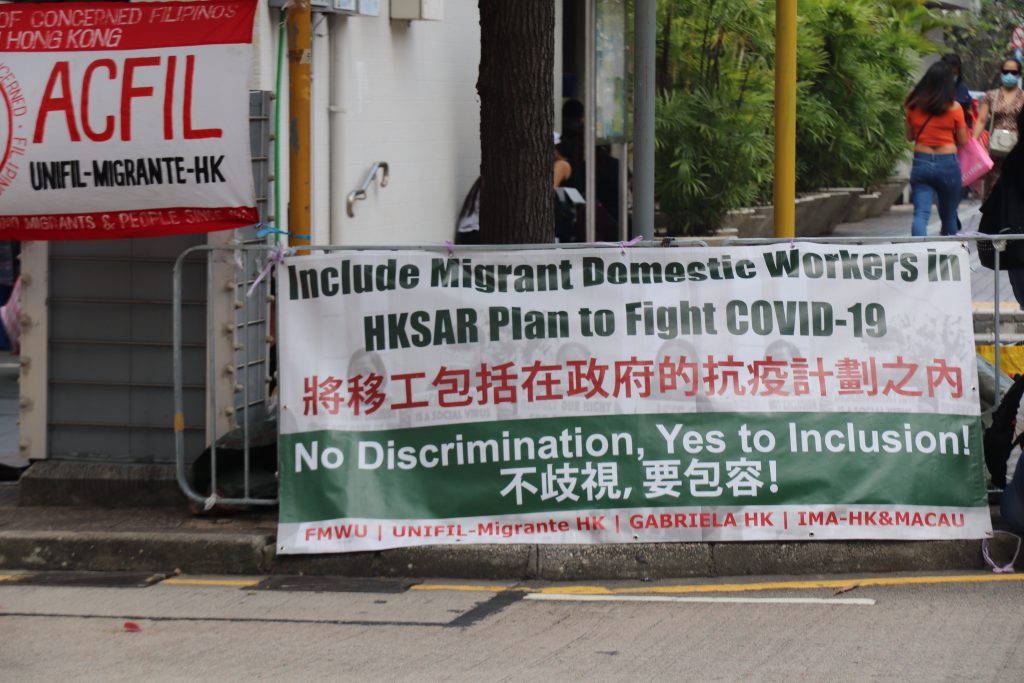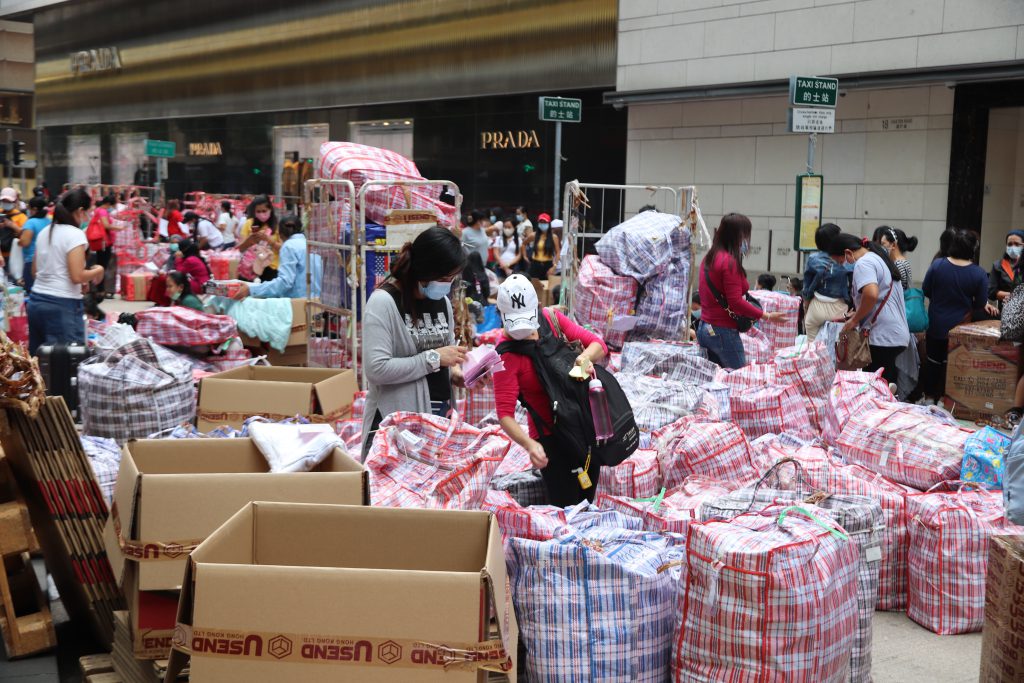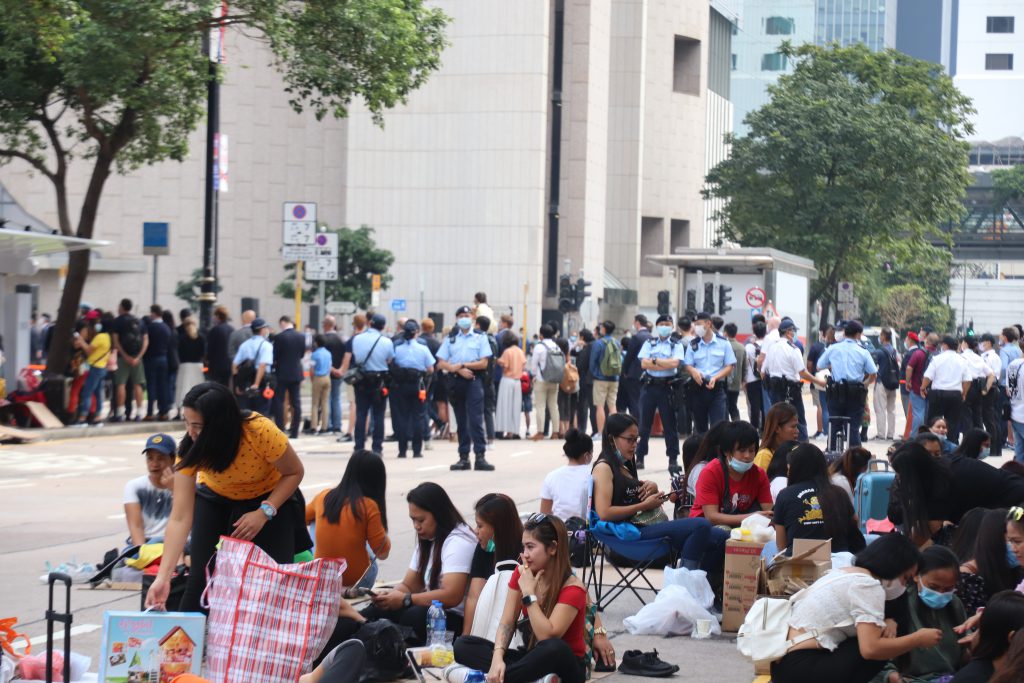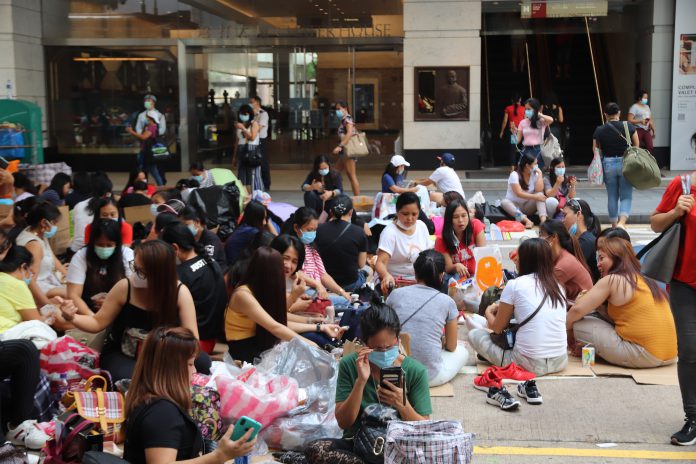Vulnerable migrant workers being discriminated and exploited during COVID-19.
By Bonita Wong
More recognition and protection should be given to nearly 400,000 migrant domestic workers in Hong Kong, especially to those suffering from heavy workload and unfair treatment during the pandemic.
Filipino domestic helper Lia* needs to juggle taking care of a seven-month-old baby and more daily work as her employers are currently working from home.
“The workload doubles. Before COVID-19, I just need to cook dinner. But then when my employers work from home, I need to cook breakfast, lunch and dinner,” Lia says.
Lia has been working in Hong Kong for three years. “The problem that I am struggling with is pressure. My employers work in a bank, and their work is really a stressful one, especially given the economic status of Hong Kong now. Because they are pressured, and they are at home, so they check every single detail of my work,” Lia says.

The situation improved when the second helper reported duty in June.
“Even we have a second worker, I am responsible for everything. If the second worker did not do her job properly, the blame is on me. Also, both of my employers are foreigners, I am not used to their expressions and I am very sensitive about that, so emotionally I am so depressed at first,” she says.
According to an online survey conducted in March by Asian Migrants Coordinating Body – the first and biggest coalition of migrant worker association and union in Hong Kong, more than half foreign domestic helpers had the same experience as Lia that their workloads increased. 40 per cent of the 1,127 respondents did not have weekly rest days as stated in their contracts.
Lia’s employers asked her not to go out on Sundays when Hong Kong was hit by the third wave of COVID-19 in July. She had to meet her friends online for five weeks. Fortunately, Lia has her own room and toilet, and her employers did not assign her any work on rest days.
“But the discrimination is still there. When the number of cases goes down, they say ‘okay you can go out but please don’t meet your friends,” Lia says. “Why should I not meet my friends and you can let your friends visit us in the house? We workers have strict self-discipline. We have family in the Philippines waiting for us. If we are sick, we are alone. Why can’t I meet my friends? Do you mean that we Filipinos or migrant workers carry the virus?” she argues.

“Why can’t I meet my friends?
Do you mean that we Filipinos or migrant workers carry the virus?”
Lia says she is fortunate to have masks and alcohol sprays from her employer because she knows many workers are treated unfairly and do not receive proper protection.
“Migrant workers are frontliners (who fight against the pandemic) as well. We are the ones who look after the cleanliness (hygiene) of the house, going in and out of the house to get food and protective materials for families,” says Shiela Tebia-Bonifacio, chairperson of Gabriela Hong Kong, an alliance supporting Filipinos in the city.
“Many of us cannot go out and some are not compensated well for overtime work. If you don’t have your own room, what can you do inside the house? You work. Do you expect migrant workers to sit down with their boss on the sofa on Sunday?” Tebia-Bonifacio says. “Before COVID-19, migrant workers are already complaining, some are working 16-20 hours a day, staying up till 11 p.m. to 12 a.m. Now it’s worse,” Tebia-Bonifacio adds.
These frontliners in the city’s battle against the pandemic not only need to bear heavier workload and hardship at work amid the pandemic, some are forced to live with their employers when they are tested positive for COVID-19 or had close contacts with the infected.
Kuya Edwin, a domestic helper from the Philippines, recalled her anxieties in July. She was required to have two-week self-quarantine with her employer after the son of the family had close contact with an infected patient when attending a dinner gathering earlier that month.
“I was so worried during the 14 days. I was also very scared of doing the swab test as I really hate needles and things like that. And he (employer’s son) only kept saying sorry. I stayed at home for two weeks with no holidays,” says Edwin who has been working in Hong Kong for 28 years.
Luckily, her employer’s son was tested negative.
“I can say a lot of migrant workers are experiencing long working hours and no day offs. We have a lot of members crying saying about how their employer treated them (badly),” Tebia-Bonifacio says.
“We have a lot of members crying saying about how their employer treated them (badly).”
But no worker dares to file a formal complaint, fearing they may lose the job.
“Why aren’t they complaining? Just because of termination. If they complain, it means they risk termination. Are they really prepared for termination? No, because they have family back home who are relying on them,” she says.
Gabriela Hong Kong pointed out the government fails to offer a helping hand to foreign domestic workers. It turned its back on worker’s inhumane working conditions and stigmatize foreign domestic workers instead of promoting social inclusion.
Concern groups like Gabriela Hong Kong, Asia Pacific Mission for Migrants and Mission For Migrant Workers designed, printed and distributed information leaflets with updated policies concerning COVID-19 and virus testing. They also teach workers to safeguard their labour rights and welfare and distribute free face masks, hand sanitizers to workers on Sundays.

These should be employers and Hong Kong government’s responsibility,” Tebia-Bonifacio says.
She was furious when the Labour Department urged foreign domestic helpers to stay at home on rest days in January and March and avoid going out for social activities on rest days such as meal gatherings.
“It’s very discriminatory when they say please don’t go out during your holidays. From Monday to Saturday, you let your helper go to the market, do the errands, and you don’t care about the virus? But then for just the day that they can take a rest, be free from their work, you tell them not to go out to not get the virus. So are you telling us that the virus is only active during Sunday? Or are you telling us the virus is only in the migrant workers’ -community?” Tebia-Bonifacio says.
“We also need a rest like you. Sitting on the streets is our way of rest. That one day will recharge our body, our mind,” she adds. “There are a lot of ways to protect migrant workers. But don’t tell us to protect us by not letting us go out on our day off. The Hong Kong government should at least recognise our contribution and provide us with proper protection. But not singling us out, not discrimination, but inclusion,” she says.
“We also need a rest like you.
Sitting on the streets is our way of rest. That one day will recharge our body, our mind.”
*Name changed at interviewee’s request
Edited by Howard Li











































